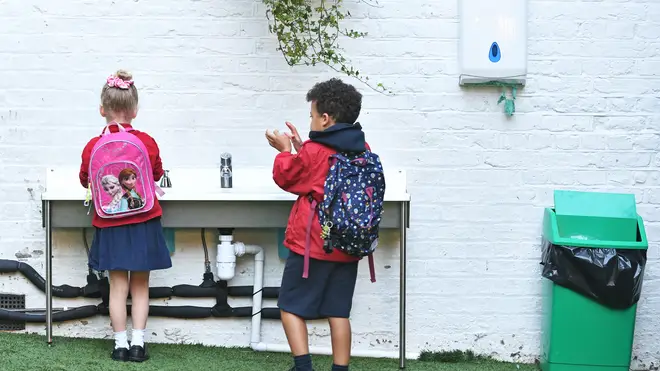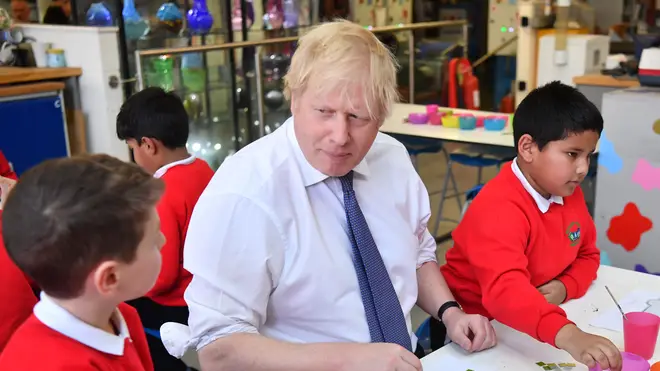
Shelagh Fogarty 1pm - 4pm
5 March 2021, 00:06

"Unsustainable" pressure on school staff could put the Government's education recovery plans at risk, a school leaders' union has warned.
Paul Whiteman, general secretary of the NAHT school leaders' union, believes an "exodus" of headteachers could take place post-Covid after an "exhausting" and "stressful" year for school staff.
His comments came as a poll by the union revealed that nearly half (46%) of school leaders said they had 31% or more of their normal roll attending class in person before February half-term.
More than one in eight (13%) said they had 41-50% of pupils come into school amid the lockdown, according to a survey.
The overwhelming majority (91%) of school leaders said demand for places - among children of key workers and vulnerable pupils - has increased since the beginning of the current lockdown.
The poll found that 64% of school leaders said they have worked at least six additional hours per week on average since the beginning of this term as a result of the coronavirus pandemic.
Nearly two in five (38%) said they have worked an average of 51-60 hours a week since the start of term, according to the survey of more than 3,000 school leaders across England in February.

Mr Whiteman said: "These figures prove once and for all that schools are not and have never been closed.
"Teachers and school leaders have in fact been working harder than ever to juggle the demands of remote teaching for pupils at home, while also caring for those vulnerable and key worker children in school.
"The worry is that the workload and pressure on school staff at the moment is simply unsustainable - and could threaten the education recovery to come."
The latest Government figures suggest that more than one in four (27%) primary school pupils in England were taught on-site last week.
Overall, 18% of state school pupils were in class last week, up from 16% before half-term, according to the Department for Education (DfE) statistics.
All pupils in England will return to class from Monday after months of remote learning.
Read more: Italy blocks Astrazeneca vaccine shipment to Australia amid frustrations over shortages
Read more: Nursing union slams 'pitiful' one per cent pay rise for NHS staff

Top virologist: 'Teachers should be vaccinated as part of roadmap'
Last week, Boris Johnson announced an extra £400 million of funding - on top of the £300 million pledged in January - to help pupils make up lost learning time following closures.
As part of the recovery package, secondary schools have been asked to deliver some summer teaching and tutoring schemes will be expanded.
The Government considered a variety of options as part of the catch-up plans - such as extended school days and shorter summer holidays - but they were not included as part of the immediate proposals to recover lost learning.
Read more: New coronavirus variant added to UK watch list
Read more: Cyprus to allow vaccinated British tourists to holiday from 1 May

Education Secretary sets out details of post-Covid funding for schools
It comes as nearly two in five parents said they are not confident that schools will remain open for the rest of the academic year.
The majority (56%) of parents are worried about their child's mental wellbeing and 31% are worried their child has fallen behind during closures, according to a poll by Save the Children.
Ahead of the return to school in England next week, more than two in five (41%) children said they are happy about going back to class after months of remote learning, the report shows.
But many parents said they have struggled to stay positive (55%) and to cope emotionally (43%) over the past year.
The survey, of more than 1,000 parents of school-age children, also suggests that mothers are worrying about their child's wellbeing more than fathers.
It found 46% of mothers are concerned that their child's confidence/anxiety levels will not go back to normal over the next few months, compared to 34% of fathers who are worried.
Nearly two in five (39%) parents said they were not confident that schools will remain open for the rest of the year.
The poll, which also surveyed more than 1,000 children aged between six and 18, found that 69% of pupils believe they will be able to catch up on their education when back in school.
But anxieties are higher for low-income families - those who have an annual household income of less than £15,000 - where 39% of children reported that they feel they have fallen behind with their schoolwork and a fifth said they did not have the right equipment to learn from home.
Nearly half of parents in low-income families have worried about paying bills (47%) and buying food for their family (43%) over the past year, the report suggests.

Furious trainee teacher brands PM's roadmap 'an absolute disgrace'
On Friday, the Department of Health and Social Care announced that millions more children and young people will have access to significantly expanded mental health services, backed by £79 million funding.
The department also said the number of mental health support teams in schools and colleges will grow from 59 to 400 by April 2023, supporting nearly 3 million children.
Access to community mental health services will also be expanded, giving 22,500 more children and young people access to help and support by 2021/22.
Health Secretary Matt Hancock said: “Over the last year great focus has rightly been placed on our physical health, but I am incredibly conscious of the impact the pandemic has had on peoples' mental health and wellbeing.
“Children and young people have been particularly impacted by disruption to their routine, education and social lives and I am committed to doing all I can to ensure mental health support is there for those who need it.
“Our response to this global pandemic will not only treat the public health threat of coronavirus but ensure our clinicians have the resources to respond to the long-term impact on people’s mental health, to provide support to everyone in their hour of need.”